Scotland almost £15 billion in debt and its deficit is almost twice as large as the UK as a whole, say new figures
New figures deal a severe blow to key SNP arguments in favour of independence

Your support helps us to tell the story
From reproductive rights to climate change to Big Tech, The Independent is on the ground when the story is developing. Whether it's investigating the financials of Elon Musk's pro-Trump PAC or producing our latest documentary, 'The A Word', which shines a light on the American women fighting for reproductive rights, we know how important it is to parse out the facts from the messaging.
At such a critical moment in US history, we need reporters on the ground. Your donation allows us to keep sending journalists to speak to both sides of the story.
The Independent is trusted by Americans across the entire political spectrum. And unlike many other quality news outlets, we choose not to lock Americans out of our reporting and analysis with paywalls. We believe quality journalism should be available to everyone, paid for by those who can afford it.
Your support makes all the difference.Scotland is now almost £15 billion in the red and its deficit is almost twice as large as the UK as a whole, according to newly-published official figures, which also dealt a severe blow to one of the key arguments advanced by the SNP in favour of independence.
The statistics showed that for the first time in 35 years, Scotland generated less tax per head than the rest of the UK. Although the difference is only slight, the reversal is significant because the former SNP leader Alex Salmond repeatedly used Scotland’s historically higher tax receipts to support the case for independence during 2014’s referendum campaign.
The SNP’s political opponents said the Government Expenditure and Revenue Scotland figures – published a fortnight before the date at which the country would have become independent had it voted to leave the Union – illustrated the potentially “devastating impact” of a Yes vote.
The figures, which highlight the effect of falling North Sea oil revenues on Scotland’s finances, show that Scotland’s deficit reached £14.9bn in 2014/15, up from £13.4bn in the previous financial year. The figure amounts to 9.7 per cent of Scottish GDP, compared with the overall UK deficit of 4.9 per cent of GDP.
Scotland raised around £10,000 in tax per person – a figure described as “slightly below” the UK average – and spent £12,800 per person, around £1,400 more than the UK as a whole. The statistics, often used to inform the debate about Scotland’s potential for independence or gaining further powers from Westminster, are produced independently of ministers.
Nicola Sturgeon, Scotland’s First Minister, insisted that “the foundations of Scotland’s economy are strong”. But at a briefing with reporters shortly after the figures were published, she admitted that they showed a “deterioration” in the country’s finances due to the dramatic fall in the price of oil.
Stressing that the statistics should be looked at “in context”, she added: “No country anywhere in the world looks at its fiscal position and makes judgements about [it] based on one year’s figures. Over the past ten years, the reality is that Scotland’s fiscal position has been broadly similar to that of the rest of the UK.”
However, Holyrood’s opposition parties said the figures showed that Scotland would be facing a bleak future had it voted to leave the Union 18 months ago and accused the SNP of overestimating the value of North Sea oil in an attempt to persuade Scots to back independence.
“Had their con succeeded, we would now be only 15 days away from separating the most successful political Union in history in favour of a leap into the dark,” said Murdo Fraser, the Scottish Conservatives’ finance spokesman.
Kezia Dugdale, the leader of Scottish Labour, added: “These figures from the SNP Government show once and for all the devastating impact leaving the UK would have had on Scotland’s finances…People were misled by the SNP in the run-up to the referendum and that is unforgivable.”
Scotland Office minister Andrew Dunlop also took the opportunity to highlight the benefits of the Union. “These figures show that Scotland is facing challenging economic times, in particular because of the drop in oil price, and demonstrate the value of the broad shoulders of the United Kingdom,” he said.
However, Ms Sturgeon said she would take “the opposite view”, pointing out that Scotland had so far contributed £300bn in North Sea oil revenues to the Treasury and questioning why the UK Government had not set up a Norwegian-style oil fund to protect the industry in hard times. “What we are talking about here today is – certainly at least in part – an indictment of the mismanagement by the UK of Scotland’s finances and our oil revenues in particular,” she added.
Join our commenting forum
Join thought-provoking conversations, follow other Independent readers and see their replies
Comments